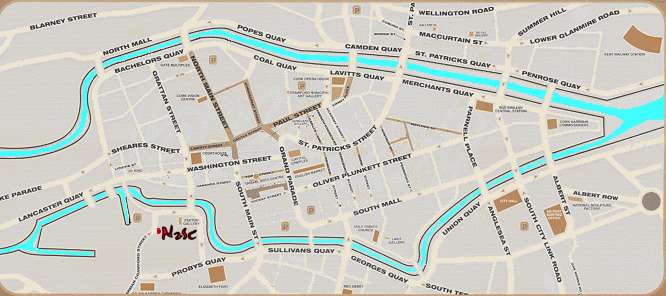
Nasc's location in Cork City

Nasc - a brief history
Over the past five years there has been a gradual increase in the number of people coming to Ireland to seek asylum. These numbers are still tiny by the standards of other European countries. Moreover, one must remember that the vast majority of all refugees find themselves in countries in the Majority World, countries, which in spite of their poverty are frequently more generous in their welcome than those of the rich North.
Asylum seekers coming to Ireland in the 1990s found themselves in a country which had no policies and no services for them. At first the great majority stayed in Dublin. They began to organise themselves and the Irish voluntary sector gradually became involved with support and services.
By late 1999 housing became increasingly difficult and expensive to find in Dublin. The Government embarked on a hasty and badly-planned effort to 'disperse' asylum seekers throughout the country, often to places where no prior consultations had taken place and no services were available. Asylum seekers themselves had no choice in their destination. In April 2000 these new arrangements were formalised. There was to be no choice about destination or accommodation. The worst feature of the new regime was that asylum seekers were no longer entitled to normal social welfare allowances but instead received weekly pocket money of IR£15 per week, IR£7.50 per child. In effect, the new arrangements isolated them from the communities in which they found themselves. Apart from a once-off decision in July 1999 concerning people already in Ireland for a year, work permits are not granted.
The above developments combined with the lack of political direction to generate a crisis atmosphere. However uncalled for this "crisis" was, it was clear that asylum seekers themselves needed services and assistance which were not being provided, and that Irish society was likely to experience an upsurge in racism which would have to be countered.
In Cork and in other cities and towns, local people became involved in filling some of the gaps which Government policy had created. Three organisations were already active here - CARASI (Comhlámh Action for Refugees, Asylum Seekers and Immigrants), Immigrant Solidarity and Welcome English Classes. For the most part our work was focused on lobbying and outreach, particularly the running of workshops and classes on anti-racism, and English classes for the small number of asylum seekers then in the city.
With the introduction of this policy of "dispersal" by the Government in late 1999, and the change in the welfare regime to the system of ‘direct provision’ described above, it was obvious that Cork, which had previously seen few asylum seekers, would shortly encounter major changes. This has indeed turned out to be the case, with an increase in the past six months to the present figure of approximately 800, concentrated for the most part in four hotels.
A loose coalition of individuals, as well as members of CARASI and Immigrant Solidarity and Welcome English Classes, began to work towards the previously impossible dream of a full-time drop-in centre to work with this rapidly-growing asylum seeking, refugee and immigrant community in Cork.
The catalyst which provided the next big break-through was the donation in Spring 2000 of a building by the Sisters of Mercy as well as a significant financial contribution by that Order and a comparable amount from the SMA Fathers. Further support came from other religious sources in the months that followed.
Within a matter of months NASC, the Irish Immigrant Support Centre, was founded. A full-time coordinator, Brendan Hennessy, was appointed and we opened our doors for the first time in June 2000.
Since then two additional staff have come on board, Katherine Dullaghan (Volunteer Support Worker/Administrator) and Aoife Collins who is conducting research into the needs of asylum-seekers in Cork. In 2002 Nasc will benefit from the recruitment of three new full-time staff:
Accommodation Officer, Outreach Officer and Training Officer.
Although progress has been made, much work remains to be done. In particular, we continue to aim for a collaborative, partnership-based organisation in which host and new community representatives work together in mutual respect, using their complementary attributes and experience. We also need to work to secure core funding and go forward with a well-resourced, adequately staffed centre, offering a range of necessary services and information as well as providing an essential welcoming environment for all members of the asylum seeking, refugee and immigrant communities.
Phone (021) 4317411. Fax (021) 4317402. Email us at iisc@eircom.net